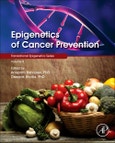Epigenetics of Cancer Prevention, Volume Ten is the first to look at epigenetics and chemoprevention together. Although there is numerous scientific data available on how epigenetics can lead to cancer and how chemoprevention can be beneficial in the treatment of, or improvement of quality of life, together they will set an advanced understanding for the reader in this upcoming field of chemoprevention influencing epigenetics. This book discusses molecular epigenetic targets of natural products, such as green tea polyphenols, curcumin and resveratrol, and organ specific epigenetic targets related to diverse types of cancer, for example prostate, colorectal, breast, lung and skin cancers.
Additionally, it encompasses a discussion on research methods and limitations to study epigenetics and epigenomics of chemopreventive drugs and personalized cancer treatment with phytochemicals. The book is ideal for cancer researchers, health care professionals and all individuals who are interested in cancer prevention research and its clinical applications, especially in natural remedies.
Please Note: This is an On Demand product, delivery may take up to 11 working days after payment has been received.
Table of Contents
Foreword
I. MOLECULAR EPIGENETIC TARGETS OF NATURAL PRODUCTS
1. Genetic and Epigenetic Targets of Natural Dietary Compounds as Anticancer Agents QIWEN SHI, ANUPAM BISHAYEE, AND DEEPAK BHATIA
2. Epigenetic Dietary Interventions for Prevention of Cancer PRADHAN NIBEDITA, KAR SWAYAMSIDDHA, PARBIN SABNAM, SENGUPTA DIPTA, DEB MOONMOON, DAS LAXMIDHAR, AND PATRA SAMIR KUMAR
3. Natural Anticancer Agents: Modifying the Epigenome to Prevent and Treat Cancer KRISTINA ANDRIJAUSKAITE, JAY MORRIS, AND MICHAEL J. WARGOVICH
4. Histone Deacetylase Inhibitors in Cancer Prevention and Therapy SHAHRZAD MOVAFAGH AND AMANDA MUNSON
5. Epigenetic Effects of Curcumin in Cancer Prevention MUTHU K. SHANMUGAM, FRANK ARFUSO, JUDY C. SNG, ANUPAM BISHAYEE, ALAN PREM KUMAR, AND GAUTAM SETHI
6. The Epigenetic Targets of Berry Anthocyanins in Cancer Prevention DINA MOUSTAFA ABO EL-ELLA AND ANUPAM BISHAYEE
7. Isothiocyanates, Epigenetics, and Cancer Prevention SILVIA NOVÍO, MARÍA JESÚS NÚÑEZ-IGLESIAS, AND MANUEL FREIRE-GARABAL
8. Epigenetic Mechanisms of Resveratrol and Its Analogs in Cancer Prevention and Treatment AVINASH KUMAR AND ANAIT S. LEVENSON
9. Epigenetic Mechanisms of Quercetin and Other Flavonoids in Cancer Therapy and Prevention GIAN LUIGI RUSSO AND PAOLA UNGARO
II. ORGAN SPECIFIC EPIGENETIC TARGETS OF NATURAL PRODUCTS
10. Dietary Phytochemicals, Epigenetics, and Colon Cancer Chemoprevention RITIKRAJ ARYA AND SABITA N. SALDANHA
11. Epigenetic Aspects of Hepatocellular Carcinoma Chemoprevention RENATO HEIDOR, ERNESTO VARGAS-MENDEZ, AND FERNANDO SALVADOR MORENO
12. Epigenetic Control of Pancreatic Carcinogenesis and Its Regulation by Natural Products HASEEB ZUBAIR, SHAFQUAT AZIM, MOHAMMAD ASLAM KHAN, GIRIJESH KUMAR PATEL, AAMIR AHMAD, SACHIN PAI, SEEMA SINGH, AND AJAY P. SINGH
13. Phytochemicals as Epigenetic Modi?ers for Cancer Management With Special Reference to Lung Cancer TAMILSELVAM RAJAVEL AND KASI PANDIMA DEVI
14. Epigenetics of Prostate Cancer and Novel Chemopreventive and Therapeutic Approaches DIVYA BHAGIRATH, THAO L. YANG, RAJVIR DAHIYA, SHAHANA MAJID, AND SHARANJOT SAINI
15. Prevention of Breast Cancer by Food Bioactives in Relation to Cancer Subtypes: Epigenetic Mechanisms MICAH G. DONOVAN, ORNELLA I. SELMIN, AND DONATO F. ROMAGNOLO
16. Epigenomics of Ovarian Cancer and Its Chemoprevention OURANIA KOUKOURA, STAVROS SIFAKIS, NIKOLAOS GOUTSIAS, IRONTIANTA GKOREZI-NTAVELA, AND JIANNIS HAJIIOANNOU
III. MISCELLANEOUS
17. Dietary and Lifestyle Factors in Epigenetic Regulation of Cancer ESWAR SHANKAR, KARISHMA GUPTA, AND SANJAY GUPTA
18. Epigenetics, Public Health, Lifestyle, and Chemoprevention MASSIMO ROMANI AND BARBARA BANELLI
Authors
Anupam Bishayee Lake Erie College of Osteopathic Medicine, Bradenton, FL, United States. Dr. Bishayee has 25 years combined experience in pharmaceutical education, research, teaching and administration. His primary research interest during last two decades encompasses cancer biology, cancer therapeutics and cancer prevention. His laboratory is involved in investigating mechanism-based chemopreventive and therapeutic effects of various medicinal plants, natural products, dietary and synthetic agents using various pre-clinical models of cancer. The various projects of Dr. Bishayee are funded by the National Institutes of Health as well as private pharmaceutical/biotechnological companies.Dr. Bishayee has published at least 170 original research papers and authoritative review articles in high-impact, peer-reviewed journals and 15 book chapters, and presented over 25 papers at various national and international scientific meetings. Dr Bishayee is the Editor-in-Chief of two journals and has acted as guest editor of various journals thematic issues. He is also serving as an editorial board member and ad-hoc reviewer of more than 50 reputed journals. Deepak Bhatia Department of Pharmacogenomics, Bernard J Dunn School of Pharmacy, Shenandoah University, Fairfax, VA, United States. Dr. Bhatia has 10 years of experience in pharmaceutical education, research and training medical, pharmacy and graduate students. His essential research interest is in mechanistic studies of solid tumors and use of plant-based therapeutics for malignancy aversion. His research involves utilizing both in vitro and in vivo techniques to study gene regulation and epigenetic regulation of key genes and proteins involved in growth suppression, proliferation and inflammation. Dr. Bhatia has extensively published original research papers and review articles in high-impact, peer-reviewed journals and contributed to numerous book chapters. He has presented his research both at national and international scientific meetings. Dr. Bhatia is an Editor of two journals and serves as an editorial board member and ad-hoc reviewer of many reputed journals.








